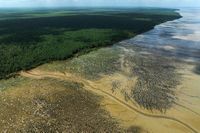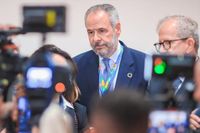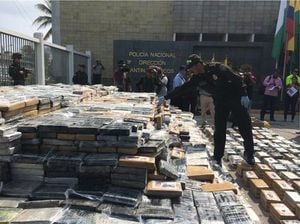As Brazil prepares for the COP30 climate conference, the contentious issue of oil exploration at the mouth of the Amazon has emerged as a focal point of debate. André Corrêa do Lago, the President of COP30, stated on March 27, 2025, during a press conference at the Petersberg Climate Dialogue in Berlin, that decisions regarding oil exploration in the Amazon will be a "national decision" rather than a consensus. This statement reflects the Brazilian government's stance that the exploration is essential for economic development, despite the potential environmental ramifications.
In his remarks, Corrêa do Lago emphasized that the discussion surrounding oil exploration is public and open, which he sees as a demonstration of Brazil's transparency. He pointed to the choice of Belém as the conference location, noting that it is a city facing significant social challenges. "The president [Lula] does not want to hide the fact that we are still a developing country with many issues to be debated," he explained. This perspective aligns with the views of Clécio Luís, the Governor of Amapá, who supports fossil fuel exploration in his state. "Even in a COP year, we need to face challenges and do what needs to be done," Luís stated during a CNN event.
Luís is optimistic about the upcoming release of a license from IBAMA, Brazil's environmental protection agency, allowing Petrobras to drill a well in block FZA-M-59 off the coast of Amapá. He anticipates that the license will be granted soon, with a crucial inspection of the Wildlife Stabilization Unit (UED) scheduled for April 7, 2025. However, this optimism contrasts with the reality that IBAMA has previously recommended denying the license.
Pietro Mendes, the president of Petrobras's board and the Secretary of Oil, Natural Gas, and Biofuels at the Ministry of Mines and Energy, warned that if the license is not issued in April, the company may face difficulties in securing a drilling platform for their operations. Mendes argued against the environmental concerns raised by opponents of drilling, citing that "1,150 vessels pass through the region annually." He questioned whether placing a drilling rig poses a significant environmental risk.
However, critics argue that the presence of these vessels does not equate to the risks associated with drilling for oil, particularly given the potential for spills that could devastate the local ecosystems, including mangroves and coastal areas across several South American countries. The Amazon River mouth is a sensitive area, and past incidents have shown that drilling operations can lead to significant environmental disasters.
Additionally, the Amapá government recently held its 5th State Environmental Conference, where participants surprisingly supported oil and gas exploration in the Amazon River mouth. This decision drew criticism for its lack of transparency and inclusivity, as many civil society organizations felt sidelined during the discussions.
In a related discussion on March 26, 2025, Deputy Elvino Bohn Gass (PT-RS) spoke at the "Equatorial Margin and Public Policies" event in Brasília. He advocated for a balanced approach to oil exploration that considers environmental preservation as part of Brazil's energy transition. Bohn Gass rejected both unrestrained exploitation and a dogmatic refusal to utilize available resources, insisting that oil exploration must align with environmental, social, and economic commitments.
He argued that not exploring domestically would negatively impact the environment, as Brazil remains dependent on fossil fuels and would need to import energy. Bohn Gass praised Petrobras as a global leader in environmental responsibility and suggested that oil royalties should fund social policies, referencing the Pre-Salt Social Fund established during Dilma Rousseff's presidency.
Despite these assertions, an analysis by InfoAmazônia challenges the narrative that Brazil's oil reserves will be depleted within ten years without exploration at the Amazon mouth. According to the data, Brazil's 15.9 billion barrels of proven reserves can last until at least 2039 if the country adheres to its climate goals. The analysis highlighted five potential scenarios for reserve depletion based on consumption and export patterns, with the most optimistic scenario aligning with the goals of the Paris Agreement.
Petrobras plans to invest $11.5 billion in renewable energy, carbon capture, and biofuels by 2028, yet the urgency for new drilling licenses appears contradictory to these commitments. The International Energy Agency (IEA) has indicated that no new oil and gas fields beyond those already approved are necessary to meet the Paris Agreement targets, provided global consumption decreases significantly.
As the deadline for IBAMA to authorize drilling approaches, there are concerns about the agency's ability to conduct a necessary emergency drill to prepare for potential spills. The simulation, known as the Evaluation of Operation Plan (APO), is critical for assessing Petrobras's readiness to respond to accidents. However, as of now, there has been no internal mobilization within IBAMA to plan this test, and the formal stance remains one of rejection regarding the drilling license.
Marina Silva, the Minister of the Environment, is expected to meet with Alexandre Silveira, the Minister of Mines and Energy, to discuss the licensing situation following President Lula's recent trip to Vietnam. As the clock ticks down, the stakes are high for both Petrobras and the Brazilian government, with significant financial implications on the line. The current daily cost of the drilling rig is approximately R$ 2.4 million, and the total investment in block 59 is estimated to be around R$ 1 billion.
In this complex landscape, the balance between economic development and environmental preservation remains a contentious topic, with voices on both sides advocating for their visions of Brazil's energy future.






